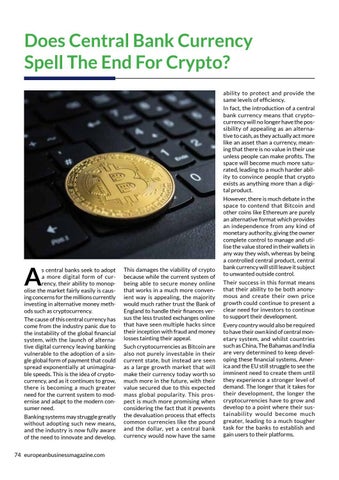Does Central Bank Currency Spell The End For Crypto?
A
s central banks seek to adopt a more digital form of currency, their ability to monopolise the market fairly easily is causing concerns for the millions currently investing in alternative money methods such as cryptocurrency. The cause of this central currency has come from the industry panic due to the instability of the global financial system, with the launch of alternative digital currency leaving banking vulnerable to the adoption of a single global form of payment that could spread exponentially at unimaginable speeds. This is the idea of cryptocurrency, and as it continues to grow, there is becoming a much greater need for the current system to modernise and adapt to the modern consumer need. Banking systems may struggle greatly without adopting such new means, and the industry is now fully aware of the need to innovate and develop.
74 europeanbusinessmagazine.com
This damages the viability of crypto because while the current system of being able to secure money online that works in a much more convenient way is appealing, the majority would much rather trust the Bank of England to handle their finances versus the less trusted exchanges online that have seen multiple hacks since their inception with fraud and money losses tainting their appeal. Such cryptocurrencies as Bitcoin are also not purely investable in their current state, but instead are seen as a large growth market that will make their currency today worth so much more in the future, with their value secured due to this expected mass global popularity. This prospect is much more promising when considering the fact that it prevents the devaluation process that effects common currencies like the pound and the dollar, yet a central bank currency would now have the same
ability to protect and provide the same levels of efficiency. In fact, the introduction of a central bank currency means that cryptocurrency will no longer have the possibility of appealing as an alternative to cash, as they actually act more like an asset than a currency, meaning that there is no value in their use unless people can make profits. The space will become much more saturated, leading to a much harder ability to convince people that crypto exists as anything more than a digital product. However, there is much debate in the space to contend that Bitcoin and other coins like Ethereum are purely an alternative format which provides an independence from any kind of monetary authority, giving the owner complete control to manage and utilise the value stored in their wallets in any way they wish, whereas by being a controlled central product, central bank currency will still leave it subject to unwanted outside control. Their success in this format means that their ability to be both anonymous and create their own price growth could continue to present a clear need for investors to continue to support their development. Every country would also be required to have their own kind of central monetary system, and whilst countries such as China, The Bahamas and India are very determined to keep developing these financial systems, America and the EU still struggle to see the imminent need to create them until they experience a stronger level of demand. The longer that it takes for their development, the longer the cryptocurrencies have to grow and develop to a point where their sustainability would become much greater, leading to a much tougher task for the banks to establish and gain users to their platforms.



































